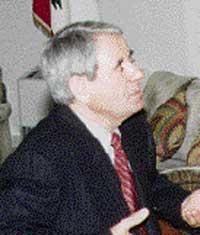 Beirut – The Lebanese cabinet decided late Monday to call on the United Nations to investigate a wave of killings of anti-Syrian individuals and to form an international court to investigate the murder of former premier Rafik Hariri. Pro-Syrian Hezbollah and Amal deputies suspended their participation in the Lebanese government to protest a vote calling for an international tribunal and to ‘widen the mission of the U.N. investigative team to cover all the assassinations that took place since October 2004’.
Beirut – The Lebanese cabinet decided late Monday to call on the United Nations to investigate a wave of killings of anti-Syrian individuals and to form an international court to investigate the murder of former premier Rafik Hariri. Pro-Syrian Hezbollah and Amal deputies suspended their participation in the Lebanese government to protest a vote calling for an international tribunal and to ‘widen the mission of the U.N. investigative team to cover all the assassinations that took place since October 2004’.
‘We are suspending our participation in the government in order to consult our leaderships after a vote by the government in favour of an international tribunal,’ Hezbollah MP and Energy Minister Mohammed Fneish told reporters. ‘It is not a resignation,’ Fneish said. The two Shiite groups oppose an international court saying ‘it enhances international interference in Lebanon’. The cabinet also decided to ask for an international court to be formed either in Lebanon or elsewhere.
Hariri, a billionaire and five-time prime minister, was killed in a Beirut blast on February 14 that was followed by a string of other attacks. The latest occurred Monday when a huge explosion targeted anti-Syrian parliamentarian and journalist Jubran Tueini, along with three others.
In October 2004, Druze cabinet minister Marwan Hamdah and Tueini’s uncle Hamadeh survived an assassination attempt.
According to United Nations sources in Beirut, the U.N. security Council will back the Lebanese decision because ‘the world community feels that there will be more escalation if the investigation is not widened and an international court is not formed’.
Earlier, hundreds of Lebanese gathered at the offices of Lebanon’s top-selling An Nahar newspaper to mourn its editor-in- chief Jubran Tueini, who will buried Wednesday in an official ceremony.
Hundreds gathered in a show of solidarity outside the vast glass tower that houses An Nahar’s headquarters in downtown Beirut while nearby shops and schools shut their doors.
Jubran Tueini, the general manager of An Nahar and an anti-Syrian politician, was killed Monday, just a day after he returned from Paris, France where he had sought refuge after a string of attacks targeting critics of Damascus.
An estimated 100 kilos of explosives were used in the car bomb that blew up as Tueini was driving past in a convoy from his home in the hills surrounding Beirut to his office downtown.
Tueini’s armoured four-wheel drive vehicle was flung 100 metres into the air and down a wooded ravine by the force of the blast, which also claimed the lives of three others and wounded ten. The explosion in the Mukles area could be heard across the capital.
‘A new martyr of independence is dead,’ read a placard held by the protestors.
Lebanon has been living in a climate of fear since 15 bombings have struck anti-Syrian journalists and politicians in the wake of the February murder of ex-premier Rafik Hariri.
Lebanese Prime Minister Fouad Seniora told a press conference earlier that Lebanon ‘will not bow. The murderers are continuing to kill us one by one but we will not bow’.
Monday’s explosion took place a day before the head of the United Nations team probing Hariri’s murder, Detlev Mehlis, is scheduled to discuss his findings before the U.N. Security Council.
The Mehlis report cited new evidence further implicating senior officers in the murder of Lebanese ex-premier Hariri, and raised doubts about Syria’s cooperation in the probe.
U.S. ambassador to the United Nations, John Bolton, was quoted by the Lebanese media describing the report as ‘very disturbing’ saying Damascus had failed to cooperate with the United Nations probe into the slaying of Hariri.
‘Even though some Syrian cooperation has been forthcoming, the substance of the Mehlis report shows failure by the government of Syria to abide (by U.N. security Council) resolution 1636 which demanded full Syrian cooperation with the U.N. probe,’ he noted.
The first report by the German magistrate issued in October concluded that top Syrian and Lebanese security officials were implicated in the killing of Hariri and accused Damascus of failing to cooperate fully with the probe.
Syria has denied accusations in its role in the Hariri murder.



